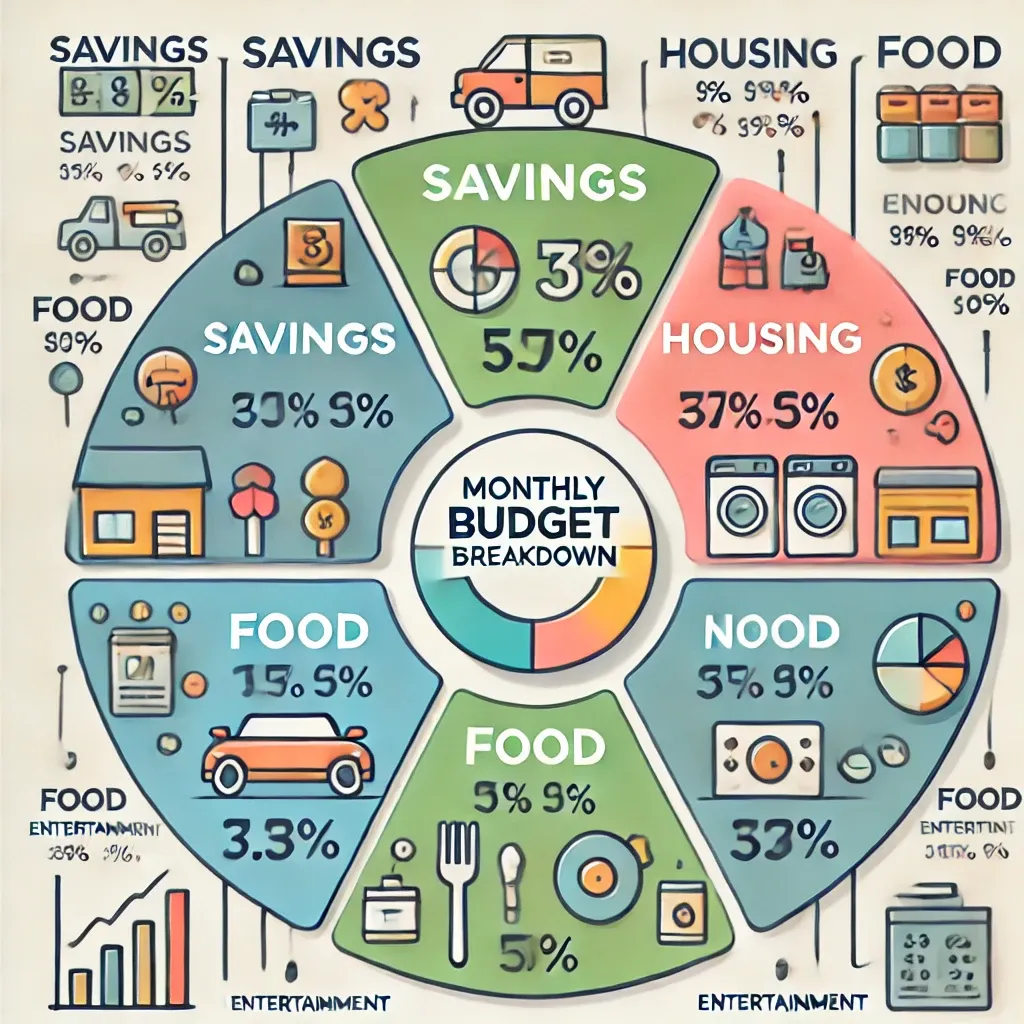Guide to Achieving Financial Success
 Personal finance is more than just managing your money; it’s about setting yourself up for a stable, successful, and fulfilling future. In a world where financial demands and challenges constantly evolve, understanding the fundamentals of personal finance is essential for anyone who wants to take control of their financial journey. This guide will cover key areas in personal finance: budgeting, saving, debt management, investing, and long-term planning. By the end, you’ll be equipped with practical tools and strategies to build a solid financial foundation.
Personal finance is more than just managing your money; it’s about setting yourself up for a stable, successful, and fulfilling future. In a world where financial demands and challenges constantly evolve, understanding the fundamentals of personal finance is essential for anyone who wants to take control of their financial journey. This guide will cover key areas in personal finance: budgeting, saving, debt management, investing, and long-term planning. By the end, you’ll be equipped with practical tools and strategies to build a solid financial foundation.
1. Understanding the Basics of Budgeting
Budgeting is the foundation of personal finance. By creating a budget, you gain insight into your income and expenses, allowing you to make better financial decisions and allocate your money effectively.
Importance of Budgeting
A budget empowers you to live within your means, avoid debt, and achieve your financial goals. It’s not about restricting your spending but rather about making intentional choices that align with your priorities.
Types of Budgeting Techniques
- 50/30/20 Rule: This budgeting method allocates 50% of your income to needs, 30% to wants, and 20% to savings and investments. It’s a simple approach that encourages balance.
- Zero-Based Budgeting: With zero-based budgeting, every dollar you earn is assigned a specific purpose, ensuring that no money is left unaccounted for. This technique requires more attention but can be highly effective.
- Envelope System: This cash-based system involves placing your budgeted money into envelopes for each spending category. Once an envelope is empty, you know it’s time to stop spending in that area.
Tips for Creating and Sticking to a Budget
Budgeting doesn’t have to be complicated. Many apps can help track expenses and monitor spending habits. The key is to regularly review and adjust your budget as your financial situation changes. Tracking your expenses is also helpful in understanding your spending habits, making it easier to identify areas where you can save.
2. The Importance of Building an Emergency Fund
An emergency fund is a financial safety net for unexpected expenses, such as medical bills, car repairs, or even job loss. Having an emergency fund protects you from debt and gives you peace of mind.
How Much Should You Save?
Most financial experts recommend saving three to six months’ worth of living expenses. However, if you’re just starting, aim for at least $1,000 as a basic cushion.
Strategies to Build an Emergency Fund
- Start Small: Begin with a manageable amount, like $20 or $50 per paycheck, and gradually increase as you can.
- Automate Your Savings: Set up automatic transfers from your checking account to a savings account each month. Automation ensures you save without even thinking about it.
- Cut Down on Unnecessary Expenses: Review your budget for expenses you can reduce, such as subscriptions or dining out, to funnel more money into your emergency fund.
Where to Keep Your Emergency Fund
It’s best to keep your emergency fund in a high-yield savings account where you can access it easily without the temptation to spend it.
3. Smart Saving Habits for Financial Growth
Effective saving habits go beyond setting aside cash; they involve planning and prioritizing for various life goals, from vacations to retirement.
Setting Financial Goals
Set clear short-term, medium-term, and long-term financial goals. Examples include saving for a down payment, a new car, or retirement. Define your goals with a specific amount and timeline, which can help motivate you to stay on track.
Automating Savings
One of the easiest ways to save consistently is to automate your savings. By setting up automatic transfers, you ensure that a portion of your income goes directly into savings before you even have a chance to spend it.
Saving for Retirement
Retirement might seem far off, but the earlier you start, the more you benefit from compound interest. Consider retirement accounts like a 401(k) or Roth IRA, which offer tax advantages and help your money grow over time. Even small, regular contributions can add up significantly over the years.
4. Navigating Debt Management
Debt can be a useful tool or a financial burden, depending on how it’s managed. Understanding the types of debt you have and knowing how to pay it down effectively is crucial for financial health.
Understanding Different Types of Debt
High-interest debt (like credit cards) can quickly become overwhelming, whereas "good" debt (such as mortgages or student loans) can have long-term benefits when managed responsibly.
Strategies for Paying Off Debt
- Snowball Method: Start by paying off your smallest debt first, then move to the next largest. This method gives a psychological boost by helping you see immediate progress.
- Avalanche Method: Prioritize paying off high-interest debts first to save on interest costs. While progress may feel slower at first, this method ultimately saves you more money.
Debt Consolidation and Refinancing Options
Debt consolidation and refinancing can simplify payments and potentially lower your interest rates. These options are particularly helpful if you have multiple high-interest debts.
Building and Maintaining Good Credit
A good credit score opens doors to better interest rates and loan approvals. To build good credit, focus on paying bills on time, keeping credit card balances low, and avoiding unnecessary debt.
5. Investing 101: Building Wealth Over Time
Investing is essential for long-term financial growth. While saving is important, investing allows your money to grow and outpace inflation, building wealth over time.
Basics of Investing
Investing involves putting money into assets, such as stocks, bonds, or real estate, with the hope of generating a return. Unlike saving, investing carries risks, but the potential for higher returns makes it worthwhile.
Risk Tolerance and Time Horizon
Assessing your risk tolerance and investment time horizon is important. Younger investors often have a higher risk tolerance since they have more time to recover from market fluctuations, whereas those closer to retirement might prioritize stability.
Investing Vehicles
- Stocks and Bonds: Stocks provide ownership in a company and potential for growth, while bonds offer more stability and fixed interest payments.
- Index Funds and ETFs: These funds provide diversification and are ideal for beginners. They allow you to invest in a broad range of stocks or bonds at a lower cost.
- Real Estate: Real estate investments, such as purchasing rental properties or investing in REITs, can be a valuable addition to a portfolio but require more capital and management.

The Power of Compound Interest
Compound interest allows your investments to grow exponentially over time. The sooner you start investing, the more time your money has to compound, leading to greater wealth accumulation.
6. Effective Financial Planning for Long-Term Goals
Long-term financial planning is key to turning aspirations into reality. Whether you’re saving for a house, a dream vacation, or retirement, having a clear plan can make achieving your goals much easier.
Setting Realistic Goals
Break down your long-term goals into manageable milestones. For example, if you plan to save $50,000 for a home, aim to save $5,000 per year for ten years. Adjust your goals based on income and expenses.
Using Financial Planning Tools
There are many online tools and apps available that can help you track and manage your financial goals, from budgeting apps to retirement calculators.
When to Seek Professional Advice
If you have complex financial needs or struggle to reach your goals, a certified financial planner (CFP) can provide personalized guidance and help you develop a comprehensive financial plan.
7. Practical Tips for Financial Success
Here are some additional strategies that can help you stay on top of your finances and achieve long-term success.
Living Below Your Means
Avoid lifestyle inflation, which is the tendency to spend more as you earn more. Living below your means allows you to save more and achieve financial independence sooner.
Building Multiple Income Streams
Having more than one income stream is a great way to increase your financial stability. Consider side hustles, freelance work, or passive income sources like dividends or rental properties to diversify your income.
Regularly Reviewing Your Financial Health
Conduct annual financial checkups to assess your progress and adjust your strategies as needed. Checking your budget, savings, and investment portfolio helps ensure you’re on track to reach your goals.
Achieving financial success requires patience, discipline, and consistency. By mastering budgeting, building an emergency fund, managing debt, and investing wisely, you lay the foundation for a secure and prosperous future. Remember, personal finance is a journey, not a destination. Taking small steps and building better financial habits over time can make a significant difference in your financial well-being. Start today, and keep moving toward a brighter financial future!
